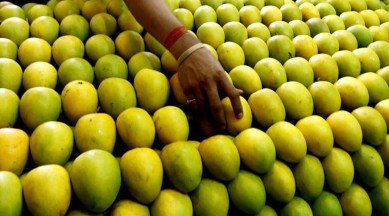In what is being termed a first in the country, tribal farmers from Nashik in Maharashtra have exported naturally-grown organic mangoes to the US. Vishal Jadhav, the managing director of Nashik based EcoKisan, said this consignment has enabled farmers to earn more than 200 per cent of their normal earnings from local markets.
The 1.2 tonnes consignment was sourced from tribal growers from nine talukas of Nashik. What makes this fruit special is that they are grown naturally along the borders of the fields by farmers in areas where chemical fertilisers are yet to become common.
EcoKisan has helped these farmers get organic certification for the farmers. “Given the salubrious condition of the fields, these wild Kesar mangoes see lesser attacks of pests. At most, some cow dung is given to the trees,” said Jadhav.
Traditionally, traders go to the fields to buy from farmers. The idea of exports came to Jadhav through a collaboration with another agriculture startup, Khetibadi.
Over the last few years, Jadhav has been working with tribal farmers in Nashik growing around 50 commodities to help them find better markets. The interventions include both B2C and B2B linkages which allow farmers to earn better. Other than fruits and vegetables, the startup also helps in marketing grains.
Commercially cultivated Kesar mangoes grown mostly in Gujarat, Maharashtra, and other parts of the country normally weigh 300-400 gm, but the naturally grown tribal mangoes weigh 190-230 gm. “What makes this fruit special is the way it is grown and the unique taste it has,” said Jadhav.
Given the biodiversity of the region, the mango trees grow naturally and manage to produce fruit regularly. “Our farmers normally sell their produce at Rs 60-70/kg but for the export consignment they got Rs 100/kg,” he said.
Story continues below this ad
Full traceability is ensured with the consignment. While numerically the 1.2-tonne consignment might just be a drop in the normal 50,000 tonnes of exports India normally reports, this marks an important step for the tribal farmers.
Jadhav, whose Ecokisan was registered in 2021, has been involved in organic and other agriculture-related activities for the last many years. The success of the first consignment Jadhav said has opened other channels for them. “We have already got orders for the second consignment. While the freight charges are high we are hopeful that the start starting of the sea route will help us reduce the same,” he said.
